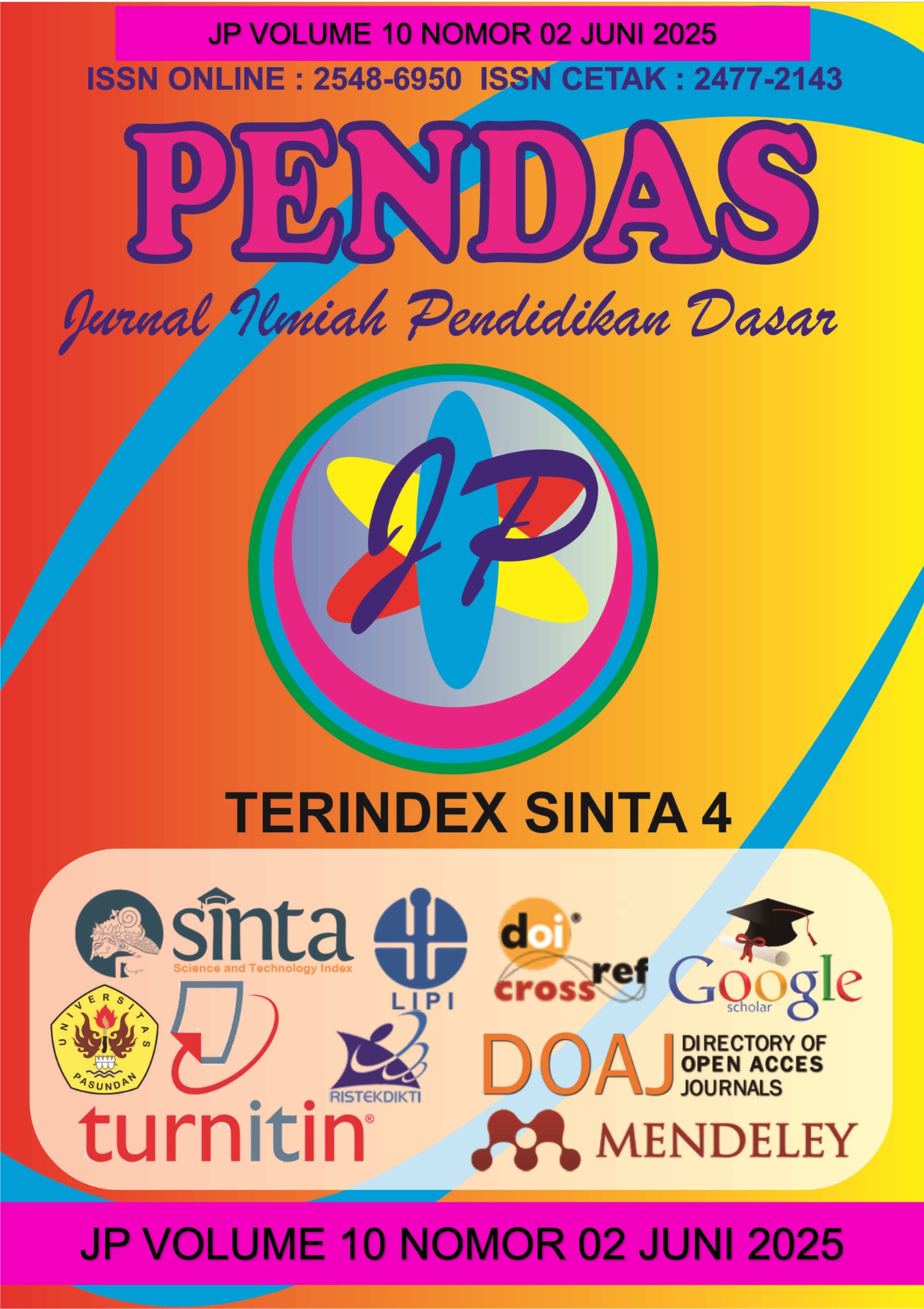BELAJAR ASYIK DAN BERMAKNA: INTEGRASI GAMIFIKASI DALAM PEMBELAJARAN KONTEKSTUAL DI SEKOLAH DASAR
DOI:
https://doi.org/10.23969/jp.v10i02.24199Keywords:
gamification, contextual learning, learning motivation, elementary school, meaningful learningAbstract
This study aims to describe the process and impact of gamification integration in contextual learning in elementary schools as a strategy to create a fun and meaningful learning experience. The background of this study is based on the fact that conventional learning in elementary schools is still monotonous, less contextual, and minimal active student involvement. The gamification approach that adopts game elements, such as points, challenges, and levels, is combined with students' real-life contexts to increase motivation and conceptual understanding. This study uses a descriptive qualitative approach with data collection techniques through participatory observation, in-depth interviews, and documentation studies. The subjects of the study included teachers, fourth grade students, principals, and parents at an elementary school that has implemented learning innovations. The results of the study indicate that contextual gamification integration can increase student involvement, strengthen intrinsic motivation, and create an active and enjoyable learning atmosphere. Teachers play an important role in designing learning that is balanced between cognitive and affective aspects. Despite facing technical and planning challenges, teachers can overcome them through reflection and adaptive strategies. In conclusion, gamification in contextual learning is an effective and relevant approach to realizing learning that touches the intellectual and emotional aspects of students in elementary schools.
Downloads
References
Aguiar-Castillo, L., Hernández-López, L., De Saá-Pérez, P., & Pérez-Jiménez, R. (2020). Gamification as a motivation strategy for higher education students in tourism face-to-face learning. Journal of Hospitality, Leisure, Sport and Tourism Education, 27(November), 1–7. https://doi.org/10.1016/j.jhlste.2020.100267
Alsadoon, E., Alkhawajah, A., & Suhaim, A. Bin. (2022). Effects of a gamified learning environment on students’ achievement, motivations, and satisfaction. Heliyon, 8(8), 1–28. https://doi.org/10.1016/j.heliyon.2022.e10249
ELALDI, Ş. (2022). Evaluation of the Effectiveness of Realistic Mathematics Education: Meta-Thematic Analysis / Gerçekçi Matematik Eğitiminin Etkililiğinin Değerlendirilmesi: Meta-Tematik Analiz. E-International Journal of Educational Research, 13, 194–209. https://doi.org/10.19160/e-ijer.1210561
Fredriksen, H. (2021). Exploring Realistic Mathematics Education in a Flipped Classroom Context at the Tertiary Level. International Journal of Science and Mathematics Education, 19(2), 377–396. https://doi.org/10.1007/s10763-020-10053-1
Hakeu, F., Pakaya, I. I., & Tangkudung, M. (2023). Pemanfaatan Media Pembelajaran Berbasis Gamifikasi dalam Proses Pembelajaran di MIS Terpadu Al-Azhfar. Awwaliyah: Jurnal Pendidikan Guru Madrasah Ibtidaiyah, 6(2), 154–166. https://doi.org/10.58518/awwaliyah.v6i2.1930
Hayati, R., Kartika, Y., Marzuki, M., Karim, A., & Fachrurazi, F. (2025). Pembelajaran Matematika Modern : Teknologi Gamifikasi dan RME dalam Mengasah Kemampuan Pemecahan Masalah. 7(2), 7–12. https://jonedu.org/index.php/joe/article/view/7923
Hayati, R., Syahputra, E., & Surya, E. (2024). Systematic Literature Review: Cultural Integration in Learning Concepts With an Ethnomathematics Approach. Proceedings of International Conference on Education, 2(1), 160–168. https://doi.org/10.32672/pice.v2i1.1333
Hidayatul Muamanah, & Suyadi. (2020). Pelaksanaan Teori Belajar Bermakna David Ausubel Dalam Pembelajaran Pendidikan Agama Islam. Belajea: Jurnal Pendidikan Islam, 5(01), 162–180. https://doi.org/10.29240/belajea.v5
Hou, H. T. (2023). Game-Based Learning and Gamification for Education. In Game-Based Learning and Gamification for Education. https://doi.org/10.3390/books978-3-0365-7515-5
Misnawati, M., Hayati, R., Zuraini, Z., Nofriati, E., & Kartika, Y. (2023). Pelatihan Pengembangan Literasi Dan Numerasi Terhadap Guru Mtss Nurul Quran Kabupaten Bireuen Provinsi Aceh. RAMBIDEUN : Jurnal Pengabdian Kepada Masyarakat, 6(3), 215–222. https://doi.org/10.51179/pkm.v6i3.2156
Priyanti, R. (2019). Pembelajaran inovatif abad 21. Prosiding Seminar Nasional Teknologi Pendidikan Pascasarjana UNIMED, ISBN : 978, 482–505. http://digilib.unimed.ac.id/38906/3/ATP 58.pdf
Ratinho, E., & Martins, C. (2023). The role of gamified learning strategies in student’s motivation in high school and higher education: A systematic review. Heliyon, 9(8). https://doi.org/10.1016/j.heliyon.2023.e19033
Salsabilla, I. I., Jannah, E., & Juanda. (2023). Analisis Modul Ajar Berbasis Kurikulum Merdeka. Jurnal Literasi Dan Pembelajaran Indonesia, 3(1), 33–41.
Septikasari, R. (2018). Keterampilan 4C abad 21 dalam pembelajaran. Jurnal Tarbiyah Al-Awlad, VIII(2), 112–122.
Wang, H., Gao, Z., Zhang, X., Du, J., Xu, Y., & Wang, Z. (2024). Gamifying cultural heritage: Exploring the potential of immersive virtual exhibitions. Telematics and Informatics Reports, 15, 4–9. https://doi.org/10.1016/j.teler.2024.100150
Wiraprana, S., & Surya, E. (2022). The Development of Mathematics Learning Devices Based on Realistic Approaches to Improve Creative Thinking and Mathematical Communication Skills for 8th Grade Junior High School Students. Jurnal Cendekia : Jurnal Pendidikan Matematika, 6(2). https://doi.org/10.31004/cendekia.v6i2.1443
Zubainur, C. M., Johar, R., Hayati, R., & Ikhsan, M. (2020). Teachers’ understanding about the characteristics of realistic mathematics education. Journal of Education and Learning (EduLearn), 14(3). https://doi.org/10.11591/edulearn.v14i3.8458
Downloads
Published
Issue
Section
License
Copyright (c) 2025 Pendas : Jurnal Ilmiah Pendidikan Dasar

This work is licensed under a Creative Commons Attribution 4.0 International License.














































